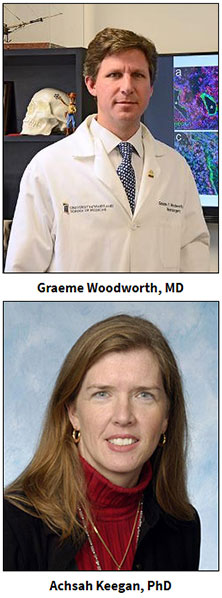February 26, 2021 | Deborah Kotz
Dr. Keller Has Served as Interim Department Chair Since 2019; He is Internationally Recognized for His Research and Discoveries in the Fields of Sensory Perception, Chronic Pain and Addiction
 University of Maryland School of Medicine (UMSOM) Dean E. Albert Reece, MD, PhD, MBA, announced today that prominent international neuroscientist and academic leader, Asaf Keller, PhD, who is Professor of Anatomy and Neurobiology at UMSOM, has been appointed to serve as the Chair of the Department Anatomy and Neurobiology, effective immediately.
University of Maryland School of Medicine (UMSOM) Dean E. Albert Reece, MD, PhD, MBA, announced today that prominent international neuroscientist and academic leader, Asaf Keller, PhD, who is Professor of Anatomy and Neurobiology at UMSOM, has been appointed to serve as the Chair of the Department Anatomy and Neurobiology, effective immediately.
Dr. Keller has served as the Department’s Interim Chair for the past year and a half, and is internationally recognized as a leader in the fields of sensory perception, chronic pain, and addiction research.
Dr. Keller was recently appointed by Dean Reece to serve as Interim Director of Comparative Medicine and Veterinary Resources, effective this week. He will serve in this capacity until newly appointed Dr. Dawn Fitzhugh begins at the UMSOM, July 1. Dr. Keller follows Robert Bloch, PhD, Professor of Physiology at the UMSOM, who served in the interim role since October, 2020.
 A Dean-appointed Review Committee was established and led by Graeme Woodworth, MD, Professor and Chair, Department of Neurosurgery, and Achsah Keegan, PhD, Professor of Microbiology and Immunology.
A Dean-appointed Review Committee was established and led by Graeme Woodworth, MD, Professor and Chair, Department of Neurosurgery, and Achsah Keegan, PhD, Professor of Microbiology and Immunology.
After extensive review and interviews with faculty across UMSOM and department faculty, staff, trainees and students, Dr. Keller received a unanimous recommendation by the Committee for appointment. Following Dr. Reece’s own review, he accepted and endorsed the committee's recommendation, and appointed Dr. Keller to the permanent chair position.
Dr. Keller, a leading researcher in the field of understanding the neurobiology of pain, joined the UMSOM faculty in 1995. His laboratory, which receives over $1 million in funding per year from the National Institutes of Health (NIH), focuses on sensory perception, delving into questions such as how the brain perceives objects and events, and optimizes the ability to detect and discriminate.
Dr. Keller and his research team are also examining what mechanisms go awry when perceptions are altered by chronic pain or drug abuse. The team takes an integrative approach, focusing on cellular networks, computations, and behavioral aspects of information processing by the brain’s neurons.
Dr. Keller received his PhD in Neurobiology from Ben Gurion University in Israel. He received postdoctoral training in Neurophysiology at Rockefeller University in New York.
 “The Department of Anatomy and Neurobiology has had a long and proud tradition of excellence in basic science and translational research under the stalwart leadership of the late Dr. Michael Shipley,” said Dean Reece, who is also Executive Vice President for Medical Affairs and the John Z. and Akiko K. Bowers Distinguished Professor. “We are so very fortunate to have Dr. Asaf Keller who, in every respect, will carry this torch of leadership, scholarship, collaboration and mentoring as the new Chair of the Department. Dr. Keller has truly earned the admiration and respect of his faculty colleagues, and I am confident he will continue this strong legacy of academic leadership and scholarship.”
“The Department of Anatomy and Neurobiology has had a long and proud tradition of excellence in basic science and translational research under the stalwart leadership of the late Dr. Michael Shipley,” said Dean Reece, who is also Executive Vice President for Medical Affairs and the John Z. and Akiko K. Bowers Distinguished Professor. “We are so very fortunate to have Dr. Asaf Keller who, in every respect, will carry this torch of leadership, scholarship, collaboration and mentoring as the new Chair of the Department. Dr. Keller has truly earned the admiration and respect of his faculty colleagues, and I am confident he will continue this strong legacy of academic leadership and scholarship.”
One of Dr. Keller’s ongoing research projects has been to examine the lasting effects of drug exposure on brain activity and whether exposure to illicit drugs, particularly during brain development, increase the risk of neurological and psychiatric disorders. In separate studies, he and his team have investigated changes in the brain that occur during withdrawal from opioids in an attempt to understand how to reduce the negative symptoms that lead to relapse.
Other areas of research for Dr. Keller’s laboratory include investigating the role of serotonin in chronic pain and whether chronic pain is caused by an abnormal release of serotonin in spinal circuits. If the animal studies yield positive results, the finding could lead to the design of novel treatments to prevent or manage chronic pain.
“Dean Reece has been incredibly supportive of our lab’s research efforts through the years, and I am honored to accept this new opportunity as Department Chair to help advance the goals of the School of Medicine and the Department of Anatomy & Neurobiology,” said Dr. Keller.
In all, the Department of Anatomy and Neurobiology received research and service grants totaling over $12 million for fiscal year 2020 from the National Institutes of Health (NIH) and other agencies. This funding calculates to $696,256 in research funding per each full-time faculty (assistant professor or above), ranking it among the top three for all academic departments in the UMSOM.
Dr. Keller and other faculty are working on multiple initiatives to expand research in the department, including through the recent establishment of the Center for Substance Use in Pregnancy. Dr. Keller has recently recruited two new faculty members to the department: Michy Kelly, PhD, Associate Professor of Anatomy and Neurobiology, is an expert in the molecular basis of age-related cognitive decline. Marco Venniro, PhD, Assistant Professor of Anatomy and Neurobiology, is an expert in the neurobiology of addiction neuroscience and social behavior.
About the University of Maryland School of Medicine
Now in its third century, the University of Maryland School of Medicine was chartered in 1807 as the first public medical school in the United States. It continues today as one of the fastest growing, top-tier biomedical research enterprises in the world -- with 46 academic departments, centers, institutes, and programs, and a faculty of more than 3,000 physicians, scientists, and allied health professionals, including members of the National Academy of Medicine and the National Academy of Sciences, and a distinguished two-time winner of the Albert E. Lasker Award in Medical Research. With an operating budget of more than $1.2 billion, the School of Medicine works closely in partnership with the University of Maryland Medical Center and Medical System to provide research-intensive, academic and clinically based care for nearly 2 million patients each year. The School of Medicine has nearly $600 million in extramural funding, with most of its academic departments highly ranked among all medical schools in the nation in research funding. As one of the seven professional schools that make up the University of Maryland, Baltimore campus, the School of Medicine has a total population of nearly 9,000 faculty and staff, including 2,500 students, trainees, residents, and fellows. The combined School of Medicine and Medical System (“University of Maryland Medicine”) has an annual budget of over $6 billion and an economic impact of nearly $20 billion on the state and local community. The School of Medicine, which ranks as the 8th highest among public medical schools in research productivity (according to the Association of American Medical Colleges profile) is an innovator in translational medicine, with 606 active patents and 52 start-up companies. In the latest U.S. News & World Report ranking of the Best Medical Schools, published in 2021, the UM School of Medicine is ranked #9 among the 92 public medical schools in the U.S., and in the top 15 percent (#27) of all 192 public and private U.S. medical schools. The School of Medicine works locally, nationally, and globally, with research and treatment facilities in 36 countries around the world. Visit medschool.umaryland.edu
Contact
Office of Public Affairs
655 West Baltimore Street
Bressler Research Building 14-002
Baltimore, Maryland 21201-1559
Contact Media Relations
(410) 706-5260
